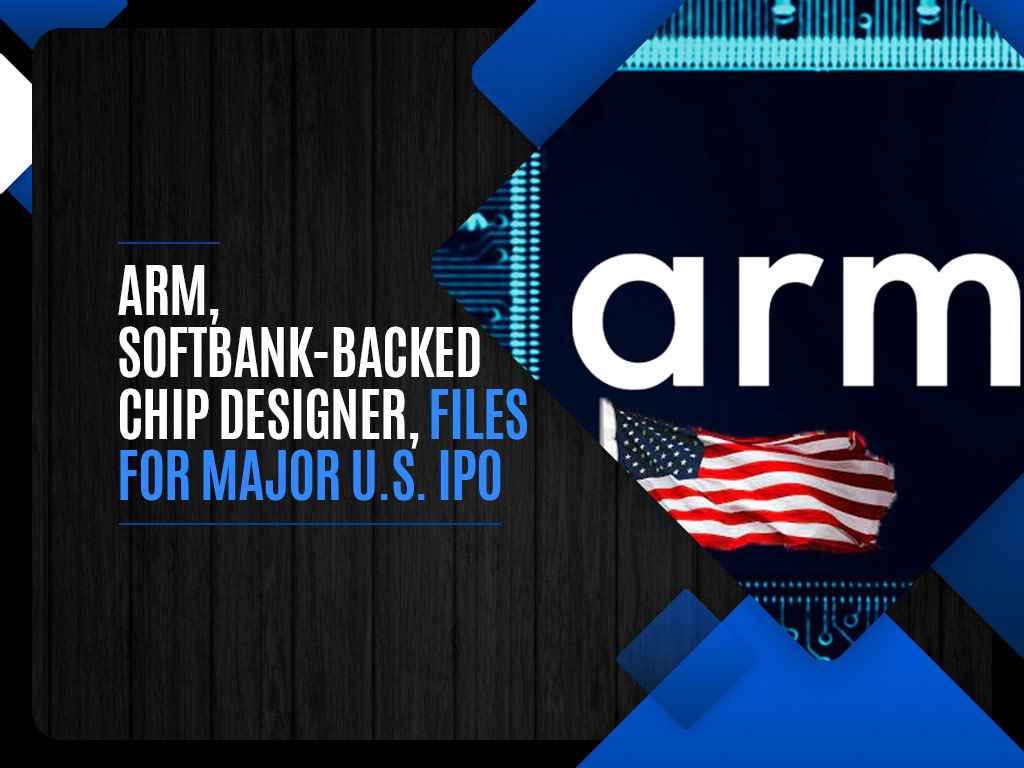Arm, SoftBank-Backed Chip Designer, Files for Major U.S. IPO

The British company has fared better than many others in the chip industry downturn and is venturing into thriving sectors like cloud computing.
In its U.S. IPO paperwork, Arm Holdings, which is backed by SoftBank Group, revealed that its annual revenue dropped by 1% due to a slowdown in smartphone sales.
For the fiscal year concluding on March 31, Arm’s sales declined to $2.68 billion, primarily due to a decrease in global smartphone shipments.
Arm’s IPO, expected to be the largest of the year, is anticipated to rejuvenate a somewhat lackluster IPO market, which has seen numerous prominent startups postpone their listing plans due to market instability.
In the fiscal year ending on March 31, Arm’s sales experienced a decline, dropping to $2.68 billion. This decline can be primarily attributed to the global smartphone market’s downturn, which had a significant impact on the company’s revenues. Furthermore, in the quarter concluding on June 30, Arm’s sales saw a 2.5% decrease, amounting to $675 million.
It’s worth noting that Arm indicated that over 50% of its royalty revenue in the most recent fiscal year came from smartphones and consumer electronics. This is particularly noteworthy considering the current state of the global smartphone market, which, according to Counterpoint Research, is expected to reach its lowest point in a decade this year.
Despite this reliance on smartphone-related royalties, Arm’s ability to maintain a relatively modest decline in revenue suggests that the rates it charges per chip have likely increased.
However, specific details about Arm’s IPO plans, including the number of shares to be offered and the targeted valuation, were not disclosed in the company’s statement. Previous reports from Reuters suggested that SoftBank was planning to sell approximately 10% of Arm’s shares in the IPO, aiming for a valuation ranging between $60 billion and $70 billion for this prominent chip designer.
Arm initially planned to raise between $8 billion to $10 billion through its IPO. However, this capital-raising target is now expected to be lower. This adjustment comes as a result of SoftBank’s acquisition of the remaining 25% stake in Arm that it didn’t directly own from the Saudi-backed Vision Fund.
This acquisition was officially confirmed by SoftBank in its filing on Monday, resulting in a 1.4% increase in shares of the Japanese conglomerate on Tuesday. Susannah Streeter, who serves as the head of money and markets at Hargreaves Lansdown, noted that although market conditions appear more favorable compared to the tech sector’s volatility last year, recent weakness during the summer months is prompting Arm to expedite its listing process.
A Second Attempt at an IPO
Arm, established in 1990, was originally a collaborative venture involving Acorn Computers, Apple (back when it was known as Apple Computer), and VLSI Technology. It remained a publicly traded company, listed on both the London Stock Exchange and the Nasdaq, from 1998 until 2016. In 2016, SoftBank acquired Arm for $32 billion, taking the company private.
The decision to prepare for an IPO for Arm came after a proposed $40 billion sale to Nvidia fell through last year, primarily due to objections raised by U.S. and European antitrust regulators. Arm’s revenue primarily comes from initial licensing fees for its technology, followed by royalties paid for each chip sold by Arm’s clients. The company has been strategically expanding these royalty revenues and has highlighted the potential for its latest technology iteration to further enhance royalty earnings per device, as mentioned in its filings.
Arm’s chip designs hold a dominant position in the smartphone industry and are also utilized in Apple laptops and some Windows devices. Furthermore, its technology has secured a 10% market share in cloud computing, where Arm-based chips serve in networking and as central processors in servers.
Despite its successes, Arm has not made significant headway into the artificial intelligence (AI) market, where Nvidia leads. However, Nvidia does offer an Arm-based processor as part of its “superchip” offerings, which combine AI and traditional central processors.
Susannah Streeter, the head of money and markets at Hargreaves Lansdown, noted that the appeal of AI remains strong, and Arm plans to leverage AI as a selling point to attract investors as it approaches its IPO.
In its most recent fiscal year, Arm reported that 24% of its revenue came from China. While this aligns with many other companies in the chip industry, it’s important to note that Arm’s revenue from China flows through Arm China, a distinct entity in which Arm holds an indirect 4.8% stake. Arm anticipates decreasing royalty and licensing revenue from China due to export controls imposed by the U.S. and British governments and the general economic downturn in China.
In August, SoftBank engaged in discussions with several tech giants, including Amazon.com (AMZN.O) and Nvidia (NVDA.O), about potential investments in Arm’s IPO. Arm’s upcoming listing is expected to inject much-needed vitality into the IPO market.
Notable names such as grocery delivery service Instacart, marketing automation firm Klaviyo, and German sandal manufacturer Birkenstock are all anticipated to launch their initial public offerings in the coming weeks.
Arm has disclosed its intention to list on the Nasdaq and will be traded under the ticker symbol ‘ARM.’ Barclays (BARC.L), Goldman Sachs (GS.N), JPMorgan Chase (JPM.N), and Mizuho Financial Group (8411.T) are leading the underwriting efforts for the offering.
Interestingly, Arm has opted not to select a traditional “lead left” bank and will distribute underwriter fees evenly among the top four banks enlisted for the IPO.

